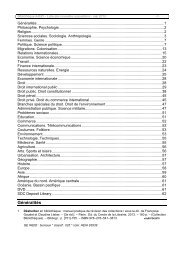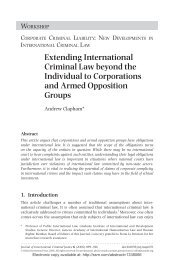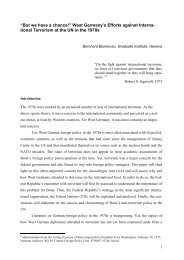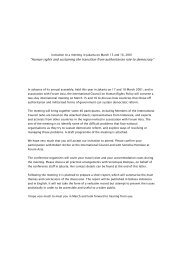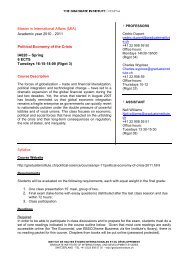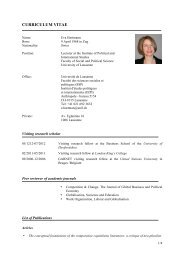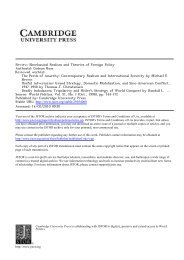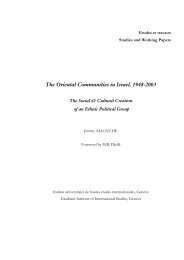Download [pdf] - The Graduate Institute, Geneva
Download [pdf] - The Graduate Institute, Geneva
Download [pdf] - The Graduate Institute, Geneva
Create successful ePaper yourself
Turn your PDF publications into a flip-book with our unique Google optimized e-Paper software.
Jacques Forster, Chairman of the <strong>Institute</strong>’s Foundation Board. Photo Eric ROSET.<br />
On the economics of famine<br />
“<br />
It’s easy for economic policy and corresponding politics<br />
to be imprisoned in an unquestioned belief that food<br />
supply, and not people’s incomes and entitlements in the<br />
market economy, is the central causal factor behind the<br />
occurrence of famine. […] Many of the major famines have,<br />
in fact, occurred without any reduction at all of food availability<br />
per head […]. Some famines have occurred in years<br />
of peak food availability as was the case in the Bangladesh<br />
Famine of 1974.<br />
”<br />
“<br />
It also becomes clear that starvation in famine is typically<br />
associated with the selective decline in the economic<br />
means and entitlement of particular occupation groups,<br />
often even a small occupation group, resulting from several<br />
possible causal economic factors such as severe unemployment<br />
[…] Or a collapse of the relative price of commodities<br />
on the sale of which many people’s livelihoods depend.<br />
”<br />
On the problems in Europe<br />
“<br />
<strong>The</strong>re’s nothing particularly surprising about the problems<br />
of balance of payment and other economic adversities<br />
that many of the European countries, Greece, Spain,<br />
Portugal, have faced given the inflexibility of the Euro zone’s<br />
insistence on no exchange rate adjustment and no independent<br />
monetary policies. […] I do believe that every<br />
country can be competitive at some set of prices. […] But<br />
you have to get the prices right.<br />
”<br />
“<br />
Austerity is an odd way of cutting deficits because as<br />
[John Maynard] Keynes noted, a reduction in someone’s<br />
expenditure tends also to reduce other people’s income,<br />
which may be a good thing to do in a situation of inflation,<br />
but it’s not really cut out for the present situation of continued<br />
recession, little inflation, and massive unemployment.<br />
[…] <strong>The</strong>re is in fact plenty of evidence in the history of the<br />
world that indicates that the most effective way of cutting<br />
deficits is through resisting recession, combining deficit<br />
reduction with rapid economic growth. <strong>The</strong> huge deficits<br />
after the Second World War largely disappeared with fast<br />
economic growth in the post-war years.<br />
”<br />
“<br />
I would argue that one of the worst aspects of the<br />
policy of austerity being comprehensively imposed<br />
along with reform has been the undermining of the feasibility<br />
of real reform, by the confounding of two distinct<br />
agendas. One agenda involves the reform of bad administrative<br />
arrangements and practice, such as people evading<br />
taxes, or government using favouritism, or for that matter,<br />
preserving unviable conventions about retiring age. […]<br />
Another agenda is austerity in the form of ruthless cuts in<br />
public services and basic social security. A serious economic<br />
analysis would tend to bring out sharply the distinction<br />
between those two. […] Bundling the two distinct issues<br />
together, reform and austerity, is not only intellectually<br />
confused. It can also lead to a policy disaster, as it seems<br />
to have in Europe.<br />
”<br />
On the importance of reasoned economic<br />
understanding<br />
“<br />
So I end this lecture by emphasising the need for learning<br />
from reasoned economic understanding, which is<br />
important today and will remain so in the future.<br />
Unfortunately, there may have been some loss both in the<br />
quality of theoretical reasoning and in sound empirical analysis<br />
in the alleged economics underlying policy thinking<br />
in Europe in recent years and the associated features of<br />
contemporary European politics.<br />
”<br />
LA REVUE DE L’INSTITUT I THE GRADUATE INSTITUTE REVIEW I GLOBE I N11 Printemps I Spring 2013<br />
21


![Download [pdf] - The Graduate Institute, Geneva](https://img.yumpu.com/23370020/22/500x640/download-pdf-the-graduate-institute-geneva.jpg)
